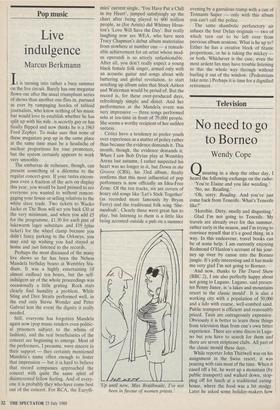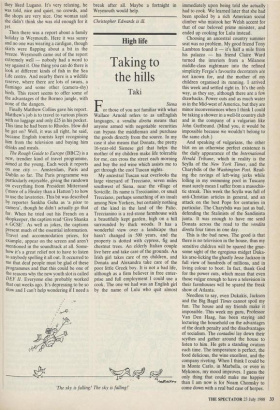Television
No need to go to Borneo
Wendy Cope
Queueing in a shop the other day, I heard the following exchange on the radio: `You're Elaine and you like weeding.'
`No, no. Reading.'
`Oh, sorry. Reading. And you've just come back from Tenerife. What's Tenerife like?'
`Horrible. Dirty, smelly and disgusting.'
Glad I'm not going to Tenerife. My travels are already over for this summer, rather early in the season, and I'm trying to convince myself that it's a good thing, in a way. In this endeavour, travel books can be of some help. I am currently enjoying Redmond O'Hanlon's account of his jour- ney up river by canoe into the Borneo jungle. It's jolly interesting and it has•made me very glad I'm not going to Borneo.
And now, thanks to The Travel Show (BBC 2), I am also perfectly happy about not going to Lugano. Lugano, said presen- ter Penny Junor, is 'a lakes and mountains resort in the classic mould'. It is also a working city with a population of 50,000 and a lido with coarse, well-combed sand. Public transport is efficient and reasonably priced. Taxis are outrageously expensive. Obviously it is better to learn these things from television than from one's own bitter experience. There are some discos in Luga- no but you have to search for them and there are seven striptease clubs. All part of the classic mould these days.
While reporter John Thirlwell was on his assignment in the Swiss resort, it was pouring with rain most of the time. When it eased off a bit, he went up a mountain (by public transport) and walked down, stop- ping off for lunch at a traditional eating- house, where the food was a bit stodgy. Later he asked some holiday-makers how they liked Lugano. It's very relaxing, he was told, nice and quiet, no crowds, and the shops are very nice. One woman said she didn't think she was old enough for it yet.
Then there was a report about a family holiday in Weymouth. Here it was sunny and no one was wearing a cardigan, though skirts were flapping about a bit in the breeze. Weymouth came out of the report extremely well — nobody had a word to say against it. One thing you can do there is look at different kinds of fish in the Sea Life centre. And nearby there is a wildlife reserve, where there are lots of swans, a flamingo and some other (camera-shy) birds. This resort seems to offer some of the advantages of the Borneo jungle, with none of the dangers.
Finally Matthew Collins gave his report. Matthew's job is to travel to various places with no luggage and only £25 in his pocket. This time he had been to Rhodes. How did he get on? Well, it was all right, he said, because English tourists kept recognising him from the television and buying him drinks and meals.
The Rough Guide to Europe (BBC2) is a new, trendier kind of travel programme, aimed at the young. Each week it reports on one city — Amsterdam, Paris and Dublin so far. The Paris programme was particularly enjoyable, giving the rundown on everything from President Mitterrand (`more of a Healey than a Hatton') to how to use the lavatories. This bit was described by reporter Sankha Guha as 'a pisse to camera', though he didn't actually go that far. When he tried out his French on a shopkeeper, the caption read 'Give Shanka a GCSE'. As well as jokes, the captions present much of the essential information. Travel and accommodation prices, for example, appear on the screen and aren't mentioned in the soundtrack at all. Some- how it's a great relief not to have to listen to anybody spelling it all out. It occurred to me that deaf people must be glad of these programmes and that this could be one of the reasons why the new youth slot is called DEF II. Everyone else probably worked that out weeks ago. It's depressing to be so slow and I can't help wondering if I need a break after all. Maybe a fortnight in Weymouth would help.















































 Previous page
Previous page